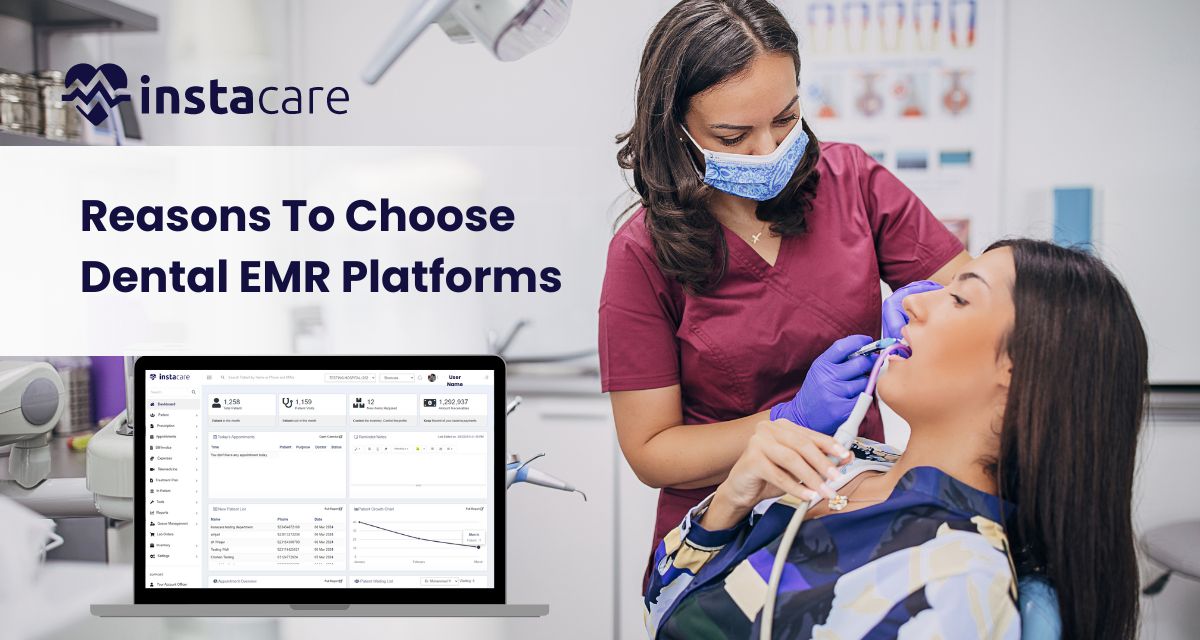Last updated on Thursday, 25, April, 2024
Table of Contents
Effective Reasons To Choose Dental EMR Platforms
The healthcare industry has always been at the forefront of technological advancements, and dental practices are now reaping the benefits of this innovation. Dental Electronic Medical Record (EMR) platforms have become indispensable tools for modern dental practices. These platforms are designed to streamline workflows, enhance patient care, and boost overall efficiency.
Dental EMR platforms have revolutionized dental practices by replacing traditional paper-based systems with digital solutions. This shift has improved the efficiency of dental practices and enhanced the quality of care delivered to patients. With features like automated appointment reminders, digital treatment plans, and integrated billing systems, dental practices can focus more on patient care and less on administrative tasks.
Streamlined Patient Management with Dental EMR
One of the most significant advantages of Dental EMR platforms is the streamlined management of patient information. Gone are the days of sifting through stacks of paper records or dealing with manual data entry errors. Dental EMR platforms store all patient information digitally in a centralized database, accessible at the click of a button.
These platforms offer comprehensive patient profiles that include medical histories, treatment plans, and billing information. This centralized approach ensures that all dental team members have access to accurate and up-to-date information, leading to improved patient care. Automated features like appointment scheduling and reminders help reduce no-shows and ensure patients receive timely care.
Enhanced Clinical Decision-Making
Access to comprehensive patient data is crucial for informed clinical decision-making. Dental EMR platforms provide dentists with a wealth of information, including diagnostic images, treatment notes, and patient histories. This readily available information enables dentists to make more informed decisions about treatment plans, leading to better patient outcomes.
Furthermore, Dental EMR platforms often include clinical decision support tools that offer recommendations based on evidence-based practices and guidelines. These tools can help dentists identify potential issues early on, recommend appropriate treatments, and monitor patient progress effectively.
Improved Communication and Collaboration
Effective communication is the cornerstone of quality healthcare. Dental EMR platforms facilitate seamless communication between professionals, specialists, and support staff. These platforms offer built-in messaging systems, shared calendars, and collaborative tools that make it easy for team members to communicate and coordinate care.
By fostering a collaborative environment, Dental EMR platforms ensure everyone involved in a patient’s care is on the same page. This leads to more coordinated and efficient care delivery, ultimately benefiting the patient.
Cost-Efficiency and Financial Benefits
Implementing Dental EMR platforms can result in significant cost savings for dental practices. By reducing the need for paper records, minimizing data entry errors, and improving overall efficiency, practices can allocate resources more effectively and enhance their bottom line.
Moreover, Dental EMR platforms often include built-in billing and coding features that streamline the revenue cycle management process. This helps practices reduce billing errors, expedite claims processing, and improve cash flow.
Data Security and Compliance
Protecting patient information is paramount in healthcare. Dental EMR platforms offer robust security features, including encryption, firewalls, and regular data backups, to safeguard sensitive patient data from unauthorized access or breaches.
Furthermore, these platforms help practices maintain compliance with healthcare regulations, such as HIPAA, in the United States. By adhering to these regulations, dental practices can avoid costly fines and penalties associated with non-compliance.
Flexibility and Scalability
Whether you run a single-dentist practice or a multi-location dental group, Dental EMR platforms can scale to meet your needs. These platforms are designed to be flexible, allowing practices to customize workflows and adapt to changing requirements easily.
As your practice grows, Dental EMR platforms can accommodate increased patient volumes, additional providers, and new services without requiring a complete system overhaul. This scalability ensures your practice can thrive and adapt to an ever-changing healthcare landscape.
Enhancing Patient Engagement
Patient engagement is key to a successful dental practice. Dental EMR platforms offer patient portals where patients can access their records, schedule appointments, and communicate with their dental team. This not only empowers patients but also strengthens the patient-provider relationship.
By actively involving patients in their care, Dental EMR platforms can improve patient satisfaction, adherence to treatment plans, and overall health outcomes. Patients who feel engaged and informed are likelier to actively participate in their oral health actively, leading to better long-term results.
Integration with Telehealth Services
In today’s digital age, telehealth has become an integral part of healthcare delivery, offering convenience and accessibility to patients. Dental EMR platforms now incorporate telehealth features, allowing dental practices to offer virtual consultations, follow-ups, and dental monitoring services.
By integrating telehealth services into Dental EMR platforms, dental practices can expand their reach, serve patients in remote or underserved areas, and provide continuity of care. This integration enhances patient satisfaction and increases practice efficiency by reducing the need for in-person visits for certain types of consultations.
Advanced Analytics and Reporting
Data-driven decision-making is becoming increasingly important in healthcare. Dental EMR platforms now have advanced analytics and reporting tools that provide valuable insights into practice performance, patient outcomes, and financial metrics.
These analytics tools offer customizable dashboards, real-time data visualization, and predictive analytics capabilities. By analyzing key performance indicators (KPIs) and trends, dental practices can identify areas for improvement, optimize workflows, and make informed strategic decisions.
The Future is Bright with Dental EMR Platforms
As we move further into 2024, the adoption of Dental EMR platforms is expected to grow exponentially. With their myriad benefits, these platforms are revolutionizing how dental practices operate, delivering better patient care and driving overall practice success.
Dental EMR platforms are not just a trend but a fundamental shift in how dental practices manage operations and care for patients. As more practices recognize the value of these platforms, we can expect to see even more innovations and advancements that will further enhance their capabilities and benefits.
Conclusion
In conclusion, Dental EMR platforms offer many benefits that make them indispensable for modern dental practices. The advantages are clear, from streamlining patient management to enhancing clinical decision-making and communication. As the healthcare landscape continues to evolve, Dental EMR platforms will undoubtedly play a pivotal role in shaping the future of dental care. Dental practices that embrace these platforms will be well-positioned to thrive in this new era of healthcare delivery.
FAQs
1-What is a Dental EMR Platform?
A Dental Electronic Medical Record (EMR) platform is a digital system designed to manage and store patient information, treatment plans, and other essential data for dental practices. These platforms replace traditional paper-based records with digital solutions, offering streamlined workflows and enhanced efficiency.
2-How Does a Dental EMR Platform Benefit Dental Practices?
Dental EMR platforms offer a range of benefits for dental practices, including streamlined patient management, improved clinical decision-making, enhanced communication and collaboration, cost-efficiency, data security, and scalability. These platforms help practices operate more efficiently, deliver better patient care, and achieve financial sustainability.
3-Is It Difficult to Transition to a Dental EMR Platform?
Transitioning to a Dental EMR platform can seem daunting, but the process can be relatively smooth with proper planning and support. Many vendors offer training and implementation support to help practices migrate from paper-based systems to digital platforms. Additionally, the long-term benefits of using a Dental EMR platform often outweigh the initial implementation challenges.
4-How Secure is Patient Data on a Dental EMR Platform?
Protecting patient data is a top priority for Dental EMR platforms. These platforms employ robust security measures, including encryption, firewalls, and regular data backups, to safeguard sensitive patient information from unauthorized access or breaches. Moreover, Dental EMR platforms help practices comply with healthcare regulations, such as HIPAA in the United States, to ensure the highest data security and privacy level.



